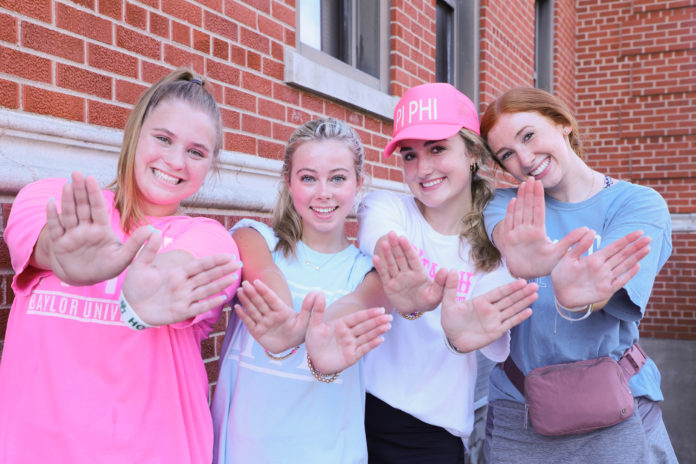
By Mariah Bennett | Staff Writer
Baylor’s Panhellenic sorority recruitment registration ends at 11:59 p.m. Dec. 5. Spring 2022 recruitment week, also known as rush week, begins on Jan. 9, but preparation and organization starts months in advance for potential new members, also known as PNMs.
PNM orientation is on Jan. 10, and recruitment rounds are four days long. The first day is Open House, the second is Philanthropy, the third is Sisterhood and the fourth is Preference Day. PNMs receive their bids on Jan. 15.
There are nine Panhellenic sororities at Baylor: Alpha Chi Omega, Alpha Delta Pi, Alpha Pi, Chi Omega, Delta Delta Delta, Kappa Alpha Theta, Kappa Kappa Gamma, Pi Beta Phi and Zeta Tau Alpha.
Each day, PNMs visit fewer sororities. They start with nine and then go down to seven, five and two. This is because of Baylor’s mutual selection recruitment, meaning both sororities and PNMs have the opportunity to speak to who they would like to see the following day of recruitment, taking in both preferences.
Before recruitment, PNMs need to submit their registration. While Baylor Panhellenic doesn’t require letters of recommendation, individual sororities may have their own requirements.
Letters of recommendation are written by alumnae of a sorority and recommend a woman for membership. While there are no page limits or specific information requirements, letters of recommendation from the Baylor University Panhellenic PNM guidebook are one page and can include a person’s name, hometown, GPA, extracurriculars, hobbies, employment, leadership positions and community involvement.
Hallie Conrad, Orange County, Calif., senior and active member of Alpha Phi, said that during rush week, a PNM’s time to shine is when she is being asked questions.
“Talk about things you’re interested in,” Conrad said. “I talked about photography just because I’m a very artistic person. It’s my way of gravitating to other parts of myself that, in my opinion, are interesting.”
Lucy Sandoval, San Diego, Calif., junior and active member of Zeta Tau Alpha, said her best tip for a PNM is to be herself but also to try to be outgoing.
“Just try your best to be as outgoing as you can be, just so that you’re talking to as many girls as you can,” Sandoval said.
Trina Wilson, Forth Worth senior and active member of Alpha Delta Pi, said a PNM should make connections early on to see where she fits best.
“Getting to have those conversations and make those connections was very helpful in making me feel at home and a lot less tense,” Wilson said.
Conrad said Open House is a baseline day when sororities give surface-level information, including their values and philanthropy. After the first day, a PNM is asked to cut a number of sororities from her selections.
Next is Philanthropy Day, when sororities speak more in depth about their philanthropies and events, including community service and fundraising projects. Conrad said Philanthropy Day was the most important round to her, as her sorority’s philanthropy had more personal significance.
Conrad said Sisterhood Day is about getting to know the individual girl, in addition to exploring sororities’ values, sisterhood and bonding events.
Conrad said Preference Day can lead to deeply personal conversation, although it depends on the girl.
“You’re trying to be very empathetic to what their needs are and what’s important to them,” Conrad said. “Rush is 100% like a speed-dating process.”
Conrad said that during rush, a PNM should bring water and stay hydrated. Wilson said that throughout the week, she brought a notebook to take notes in, which is fun to look back on over the years. Wilson also said not to panic about outfits for rounds and that there are recommendations in the PNM guidebook.
“At the end of the day, as long as you look nice and you’re presenting your best self, it’s going to be fine,” Wilson said. “It’s more important what you bring to the table as a person rather than what’s on the outside. ”




